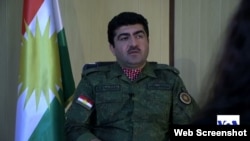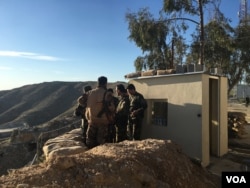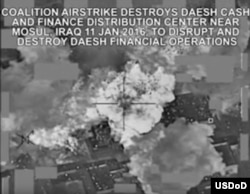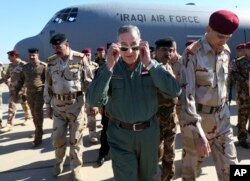VOA’S Sharon Behn and Ali Javanmardi traveled to Makhmour, to the last Peshmerga base in the frontline against Islamic State (IS). The town and surrounding villages were retaken from IS after a bloody two-month battle in 2014, and Makhmour is expected to be one of the staging points for the different military forces being gathered in the battle for Mosul. VOA spoke at length with the Peshmerga commander of the sector, Maj. Gen. Sirwan Barzani about the fight against IS.
VOA: What is the role of Sunni tribes in the fight against Islamic State in Mosul?
GEN. BARZANI: They're good to get some information from Daesh (Islamic State), from inside, and as intelligence (sources) because they have family and cousins in the Daesh area, and also it's good for the future when we go to push Daesh back from Sunni villages so they will be located there, they will be holding the land, we don't want to push the Peshmerga in there.
VOA: How do you see the fight for Mosul? What forces will be involved?
GEN. BARZANI: We don't know how many soldiers, how many Iraqi army, how many Peshmerga, if there will be Hashd-al-Shaabi - the Shia militia - or not, if there will be coalition troops on the ground or will it only be air support or airstrikes, all this, with the final plan we can tell you. But it is not easy that is for sure, especially if there is only the Iraqi army, it will be so difficult.
You know it is not only a question of pushing Daesh back, you have to hold the land also. So I think they need at least 25,000 Iraqi army for this operation, and almost 10,000 Peshmerga.
VOA: Who makes the final decision regarding the battle for Mosul?
GEN. BARZANI: The Iraqis with the Americans.
The plan has changed more than four or five times. So until today we still don't have a final plan. Before, we had six staging points, then it was four, now they say it might be three or it could be one. If they were to let me do the plan, before going to Ramadi, I would've gone to Mosul, I would not wait for Ramadi, because the most important is the capital. If you push them back from there, there will be no more capital for them, they (Islamic State) will be like partisan groups, like guerrillas, not anymore like a state. But now unfortunately they're more organized, especially tax-wise, military-wise, they are an organized competitor.
Yesterday night there was an attack, two nights ago there were two attacks in my sector, with mortars and Katyushas and snipers, there are attacks every day, every day, snipers, mortars, Katyushas, there are attacks in my sector every day.
VOA: What is the role of the Peshmerga in the fight for Mosul?
GEN. BARZANI: For the Peshmerga, for my sector, I don't talk about the city Mosul, but the rest is not difficult for us as the Peshmerga to push Daesh back. It's easy but we are worried who will hold the land after that, and are the people happy with the Peshmerga to go there or not? So our target was the Kurdish territory here, and we pushed them back. The rest belongs to the Iraqis and the central government, so we don't know if they are happy with that or not. This is the question you know? The people there, are they going to be happy if we go there or if the Iraqi army goes there or not? And who will hold the land, the place, the city? You know Mosul was under Daesh control, security-wise, and tax-wise, since five, six, seven years back.
VOA: Are you concerned about the participation of Shi’ite militia in the upcoming fight for Mosul?
GEN. BARZANI: (From a military point of view) I would say the Hashd al Shaabi (Shi’ite militia) is better, they are better fighters, they are fighting better. But what will happen, I don't know. This belongs to the politicians and the parliament.
If they need a solution for Iraq, they have to divide this country. If they want to continue to kill each other, lying to each other, it's OK, we will continue.
VOA: What is needed from the United States?
GEN. BARZANI: Of course we need everything, if they will help. The airstrikes are very important of course, but it is not enough especially if it's only with F-16s or the F-18s; there are no attack helicopters like the Apaches which is more important than the F-16 or F-18, and I don't think there will be troops on the ground really. If they were troops on the ground, with the Peshmerga, with the Iraqi army of course it will be faster as an operation to push Daesh back from Mosul.
Really, from our side, as the Peshmerga, we are ready. We just need maximum 2 to 3 weeks and we are ready, but we don't have the plan yet, and we have to wait for the Iraqis.
VOA: Are the Iraqi forces ready?
GEN. BARZANI: The 15th Brigade finished their training in Baghdad and Taji before coming here, so almost in two weeks the rest of the (Iraqi) troops will be in Makhmour. They finished their training, everything is done, but there are not enough of course for this operation. There are almost some 3,700 in Makhmour now, and there will be more in the next two weeks. But of course there are not enough, and only let’s say one flash (staging point) to go to Mosul also is not enough. Mosul is surrounded by the Peshmerga, from the west, from north, from east, from southeast, so there should be at least 3 to 5 different staging points to go to Mosul.
VOA: How dangerous is IS? What are their tactics?
GEN. BARZANI: They have experience, even they even have UAVs (unmanned arial vehicles) now, they are using new techniques, new technology especially for the suicide bombs, the remote control bombs, so they have experience really. They are dangerous people.
Only in my sector, until now, we have found more than 5816 IEDs and bombs and TNT. Just in my sector until now. And they [make] many, many types, but most of them are handmade. Some of them are remote-controlled, with mobiles, with radio, and some normal ones with the wire, so they're doing many many types of bombs.
VOA: Is IS using child fighters?
GEN. BARZANI: There are training centers, more than two or three, big training centers in Mosul. They are just starting the training at eight years old to 18 years old, there are teenagers, there are kids (being taught) how to kill the people how to do suicide (attacks).
VOA: Why are there not more airstrikes against IS inside Mosul?
GEN. BARZANI: The problem with the airstrikes, you know, is that there are lawyers sitting there, with the generals, looking at the screen and they have to give permission strike by strike, is it OK or not. The problem in Mosul is that there are more than 2 million civilian population in the city, so it is not so easy.
VOA: What is the level of coordination between the Kurdish Peshmerga and the Iraqi forces?
GEN. BARZANI: There is an operation room, there is a joint operation room between the Iraqi army, the Ministry of Defense, and the Peshmerga ministry and the Americans and the coalition. And we have meetings, almost daily meetings with our teams, and even with the MEU (Marine Expeditionary Unit), every week we have a meeting with the leaders and the generals.
(The battle for Mosul) is still under negotiation, we are waiting for the plan, and I don't know what will happen.
VOA: How important is the US “Train and Assist” program?
GEN. BARZANI: It is very important. Of course, if you ask me, it is not enough. Especially we have a lack of ammunition, we lack weapons, heavy machine guns especially. So my sector is the hottest sector in Kurdistan, and it will be more hot after the Iraqis come here because they are trying to push. So we have a lack of ammunitions. Believe me, my needs, for mortars, for DShKs — the heavy machine guns — I have a maximum of 5 percent of my needs. Maximum. So this is the situation. We need more ammo, we need more weapons, and we need night vision, we need thermal, we need everything you know, we are in a heavy war. We have more than a 1500 km frontline. It is not an easy war you know.
VOA: How coordinated is the intelligence sharing between all the different forces involved in the fight against IS?
GEN. BARZANI: In my sector, with the coalition and intelligence, and our intelligence people, officers, every week we have a weekly meeting where we exchange information, and also of course, there is the higher level in Irbil, there is a committee and the joint operation room with the coalition, even the Iraqi, and the Peshmerga. So they are exchanging information almost daily.
Almost 90 percent of the airstrikes are coordinated with our officers on the ground.
VOA: Are you concerned about IS use of chemical weapons?
GEN. BARZANI: Many times chlorine gas has been used, and in all sectors, especially my sector. But last year, 2015, on August 11 was the first time they used mustard gas, they used it three times in the same month. And of course with a more than 120 km frontline, I have 300 masks for my Peshmerga only.
I think so for sure they will try to make it better and better.
VOA: What is the impact of Kurdistan’s economic crisis on the war effort?
GEN. BARZANI: Without a budget you cannot do anything, especially in wartime. There's almost 4 months that we have not gotten any salary for the Peshmerga. And also expenses for the daily expenses, since April last year we do not get any penny until now, there is nothing for the daily expenses of the frontline of the Peshmerga. And even, in my sector until now I have lost almost 28 vehicles (since August 2014) due to suicide bombs, TNT, and there is not even one (vehicle) that I can get from the ministry of Peshmerga because there is no budget. So it is unbelievable how the war is going on, you know.
VOA: How many fighters has the Peshmerga lost in war against IS?
GEN. BARZANI: The total of all in the ministry of Peshmerga is almost 1,516 or something. It is increasing every day you know. And more than 7,000 wounded. We have almost 1,500 Peshmerga now waiting to be sent abroad to Europe or Turkey (for treatment), but there's no budget.
VOA: What do you see in the future?
GEN. BARZANI: We are asking for a referendum for the independence of Kurdistan but we don't hear anybody supporting us. It is not clear why. Is it not allowed, using this democracy way? Is there any way better than a referendum? No, but we don't hear anyone helping us, no-one supporting us. And another question that I don't get an answer to is, what is the benefit of the union of Iraq? If there is one benefit to this union, this famous union, Iraq, it is not on the ground. On the map it is OK, but if you come on the ground, there is no unity in Iraq.








